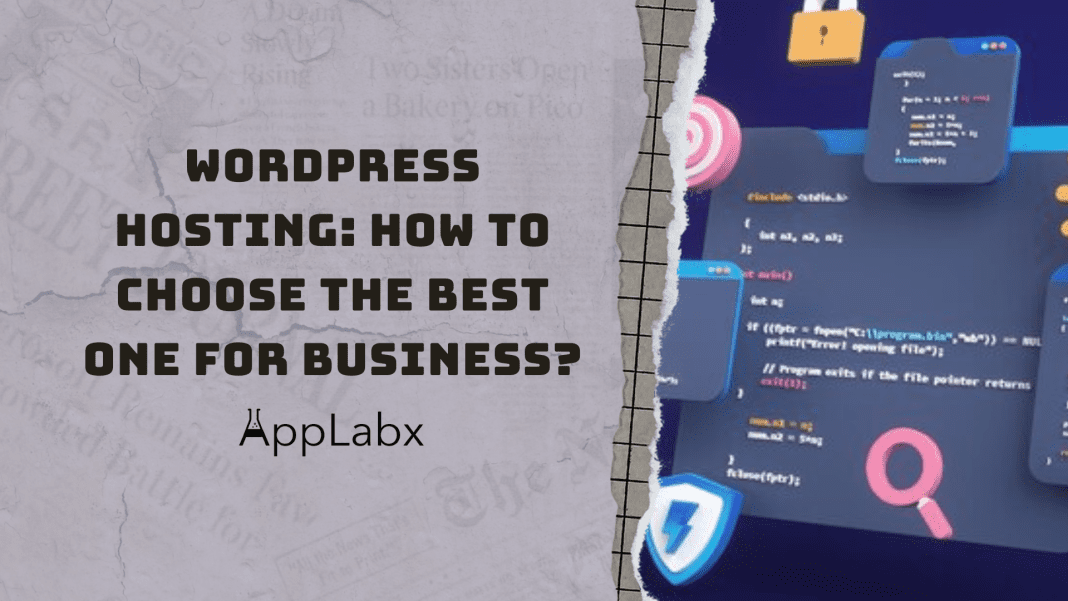Key Takeaways
- Prioritize Performance: Elevate user experience and SEO rankings by choosing a WordPress hosting provider with a focus on speed, leveraging technologies like SSD drives and advanced protocols.
- Reliability is Non-Negotiable: Foster a steadfast online presence crucial for business success.
- Strategic Decision-Making: Navigate the diverse hosting landscape by understanding business needs, comparing plans, and conducting thorough research. Make an informed decision to propel your business towards digital eminence.
In the ever-evolving digital landscape, where the online presence of businesses serves as a pivotal gateway to success, the significance of a robust website cannot be overstated.
At the heart of every powerful WordPress website lies a strategic choice that often goes unnoticed by the casual observer – the hosting provider.
Welcome to a comprehensive exploration that transcends the mundane, a journey into the intricate world of “WordPress Hosting: How to Choose the Best One for Business.”

Navigating the Hosting Landscape
Embarking on the digital frontier, businesses are confronted with a plethora of hosting options, each vying for attention and promising unparalleled performance.
As the digital realm becomes increasingly competitive, the selection of the right WordPress hosting solution emerges as a critical decision that can either catapult a business to new heights or impede its progress.
In this elaborate guide, we delve deep into the intricacies of WordPress hosting, unraveling the layers that constitute the backbone of a thriving online presence.
Defining Factors of Online Brilliance
Picture this: your website, meticulously crafted to reflect the essence of your brand, replete with engaging content and captivating visuals. Now, imagine all of this brilliance faltering at the hands of a subpar hosting provider.
The speed at which your pages load, the reliability of your website’s uptime, and the scalability of your hosting plan – these are the defining factors that can either elevate or undermine your online enterprise.
Demystifying WordPress Hosting Types
Our journey begins with an exploration of the key considerations that should shape your decision-making process.
We will navigate the terrain of performance, dissect the elements of reliability and uptime, and chart a course through the waters of scalability.
The security fortress guarding your online assets will be fortified, and we will demystify the various types of WordPress hosting – from shared hosting tailored for small businesses to the formidable dedicated hosting solutions that cater to the giants of the digital realm.
Managing WordPress Hosting
But the odyssey doesn’t stop there. We will venture into the realm of managed WordPress hosting, where automation intertwines with specialization to create an environment tailor-made for the most popular content management system on the planet.
As we navigate these hosting landscapes, we’ll equip you with the knowledge needed to discern which type aligns seamlessly with your business aspirations.
Choosing a Hosting Provider
Our compass then shifts towards the factors that should weigh heavily on your choice of hosting provider. From the responsiveness of customer support to the transparency of pricing plans, we leave no stone unturned in our quest for the ideal WordPress hosting partner.
In an age where reviews and reputations precede businesses, we guide you through the labyrinth of online testimonials, ensuring that your decision is informed by the experiences of those who have trodden this path before.
So, fasten your seatbelt as we embark on a journey into the intricate universe of WordPress hosting, where the right choice isn’t just a preference; it’s a strategic imperative for the success of your online enterprise.
But, before we venture further, we like to share who we are and what we do.
About AppLabx
From developing a solid marketing plan to creating compelling content, optimizing for search engines, leveraging social media, and utilizing paid advertising, AppLabx offers a comprehensive suite of digital marketing services designed to drive growth and profitability for your business.
AppLabx is well known for helping companies and startups use digital marketing to drive web traffic to their websites and web apps.
At AppLabx, we understand that no two businesses are alike. That’s why we take a personalized approach to every project, working closely with our clients to understand their unique needs and goals, and developing customized strategies to help them achieve success.
If you need a digital consultation, then send in an inquiry here.
WordPress Hosting: How to Choose the Best One for Business?
- Key Considerations for WordPress Hosting
- Types of WordPress Hosting
- Factors to Evaluate Hosting Providers
- Steps to Choose the Best WordPress Hosting for Business
1. Key Considerations for WordPress Hosting

Performance: The Crucial Pillar of Hosting Excellence
The Need for Speed
In the digital realm, where attention spans are fleeting, the speed at which your website loads is a decisive factor in user satisfaction and search engine rankings.
Studies have shown that a one-second delay in page response can result in a 7% reduction in conversions.
Choosing a WordPress hosting provider that prioritizes performance ensures that your visitors are not left twiddling their thumbs as your site struggles to load.
Example: Consider renowned hosting providers like SiteGround and Kinsta, both lauded for their commitment to speed optimization.
SiteGround, for instance, employs advanced technologies like SSD drives and the latest speed-boosting protocols, resulting in faster loading times for WordPress sites.
Factors Influencing Performance
Understanding the elements that contribute to optimal performance is paramount.
Server resources, content delivery networks (CDN), and effective caching mechanisms are key considerations.
A robust hosting provider invests in cutting-edge infrastructure to guarantee a seamless user experience.
Example: Cloud-based hosting services like AWS (Amazon Web Services) have gained popularity due to their scalable infrastructure. The ability to scale resources on-demand ensures that your website’s performance remains consistently high, even during traffic spikes.
Reliability and Uptime: The Bedrock of Online Presence
Downtime Implications for Business
Downtime isn’t just an inconvenience; it’s a potential revenue killer.
For businesses, especially e-commerce ventures, every second of uptime is synonymous with potential revenue.
Assessing Uptime Guarantees
When evaluating hosting providers, scrutinize their uptime guarantees. A 99.9% uptime might sound impressive, but it actually allows for about 8.76 hours of downtime per year. Look for providers that offer 99.99% or higher for optimal reliability.
Scalability: Preparing for Future Growth
Anticipating Business Expansion
Choosing a hosting solution that aligns with your business’s growth trajectory is strategic.
As your website attracts more visitors and experiences increased traffic, scalability becomes paramount.
Scalable hosting solutions ensure that your site can seamlessly handle growth without compromising performance.
Example: InMotion Hosting provides scalable VPS (Virtual Private Server) solutions that allow businesses to adjust resources based on their evolving needs. This adaptability is particularly beneficial for startups and growing enterprises.
Options for Scalable Hosting
Hosting plans should offer scalability options, allowing you to upgrade resources as your business flourishes.
Providers offering tiered plans or seamless transitions to higher-tier solutions facilitate the scalability essential for sustained success.
Example: Cloudways, a managed cloud hosting platform, allows users to effortlessly scale resources with a few clicks. This flexibility enables businesses to accommodate sudden surges in website traffic without a hitch.
Security Features: Safeguarding Digital Assets
Importance of a Secure Hosting Environment
Cyber threats are omnipresent, and a breach can have devastating consequences. A secure hosting environment is non-negotiable, safeguarding your website, user data, and online reputation.
Example: WP Engine, a managed WordPress hosting provider, implements robust security measures, including firewalls, regular malware scans, and automatic WordPress updates. This proactive approach fortifies websites against potential vulnerabilities.
SSL Certificates and Encryption
In an era where data privacy is paramount, SSL certificates are imperative. Google Chrome, for instance, marks websites without SSL as “Not Secure,” potentially deterring visitors. Hosting providers offering free SSL certificates contribute to a safer online ecosystem.
Example: Bluehost includes a free SSL certificate with every hosting plan, ensuring that data transmitted between the user and the website remains encrypted and secure.
In the intricate world of WordPress hosting, navigating these key considerations ensures that your business is anchored in a reliable, scalable, and secure online environment.
Stay tuned as we delve deeper into the various types of WordPress hosting in the subsequent sections of this comprehensive guide.
2. Types of WordPress Hosting

Shared Hosting: The Budget-Friendly Starting Point
Overview and Suitability for Small Businesses
Shared hosting is akin to sharing an apartment in the digital world.
Multiple websites reside on the same server, sharing their resources. This cost-effective option is ideal for small businesses or bloggers starting their online journey.
Example: HostGator, one of the leading shared hosting providers, offers affordable plans tailored for beginners.
However, shared hosting may have limitations, such as slower performance during traffic spikes, making it more suitable for entry-level websites with moderate traffic.
Potential Drawbacks and Limitations
While cost-effective, shared hosting has limitations. The shared server environment may lead to slower loading times during peak hours, impacting user experience. Additionally, resource limitations could hinder the scalability of growing businesses.
Virtual Private Server (VPS) Hosting: Bridging the Gap
Advantages of Increased Server Resources and Control
VPS hosting provides a dedicated virtual space within a larger server, offering more resources and control compared to shared hosting. This middle ground suits businesses that have outgrown shared hosting but may not require a dedicated server.
Example: A2 Hosting’s VPS plans boast high-performance features, including SSD storage and root access. This allows businesses to have more control over their hosting environment without the expense of a dedicated server.
Cost Considerations for VPS Hosting
While more expensive than shared hosting, VPS hosting is often a cost-effective compromise. Businesses gain enhanced performance and control without the substantial costs associated with dedicated hosting.
Dedicated Hosting: Unleashing Full Power
Full Server Control and Resources
Dedicated hosting provides an entire server exclusively for one website. This premium solution offers unparalleled performance, security, and customization options, making it suitable for large enterprises with high traffic.
Example: Liquid Web’s dedicated hosting solutions promise robust performance, with servers powered by the latest hardware. Dedicated hosting is an investment, ideal for mission-critical websites where performance is non-negotiable.
Ideal for Large Businesses with High Traffic
Large e-commerce platforms, high-traffic websites, and resource-intensive applications benefit from dedicated hosting. The dedicated server ensures that the website operates at peak performance, even during traffic surges.
Managed WordPress Hosting: Tailored Excellence for WP Sites
Specialized Hosting for WordPress Sites
Managed WordPress hosting is designed exclusively for WordPress websites. Providers optimize servers for WordPress, offering features like automatic updates, enhanced security, and expert support.
Example: WPEngine is a prominent player in managed WordPress hosting. Their services include daily backups, automated updates, and advanced security measures specifically crafted for WordPress websites.
Benefits of Automated Updates, Backups, and Security
One of the primary advantages of managed WordPress hosting is the automation of essential tasks.
Regular updates, backups, and security measures are handled by the hosting provider, allowing website owners to focus on content and business growth.
Cloud Hosting: Scalability and Reliability
Harnessing the Power of the Cloud
Cloud hosting utilizes virtual servers that draw resources from a vast network of physical servers. This decentralized approach enhances scalability, reliability, and performance.
Example: SiteGround’s cloud hosting solutions leverage the Google Cloud Platform, ensuring a scalable and robust infrastructure. Cloud hosting is particularly advantageous for businesses with fluctuating traffic patterns.
Flexible Scaling Options
Cloud hosting allows businesses to scale resources on demand. Whether facing a sudden traffic surge or expecting gradual growth, the flexibility of cloud hosting ensures that resources align with current needs.
In the diverse landscape of WordPress hosting, choosing the right type is crucial for optimal website performance and business success.
Understanding the nuances of each hosting type empowers businesses to make informed decisions based on their unique requirements and aspirations. Stay with us as we navigate further into the intricate details of selecting the best WordPress hosting for your business.
3. Factors to Evaluate Hosting Providers

Customer Support: The Lifeline of Hosting Excellence
Importance of Responsive and Knowledgeable Support
In the digital realm, where downtime and technical glitches can be detrimental, responsive customer support is paramount.
Evaluating the responsiveness and expertise of a hosting provider’s support team is critical for a seamless online experience.
Example: SiteGround is renowned for its exceptional customer support. With 24/7 live chat, phone, and ticket support, they prioritize quick and knowledgeable assistance, ensuring that businesses receive timely solutions to their hosting concerns.
Checking Customer Reviews and Testimonials
Before committing to a hosting provider, exploring customer reviews and testimonials provides valuable insights into real-world experiences. Platforms like Trustpilot and G2 Crowd offer a glimpse into the satisfaction levels of existing customers.
Example: Bluehost, a popular hosting provider, has garnered positive reviews for its customer support. Analyzing customer feedback on review platforms helps gauge the provider’s commitment to customer satisfaction.
Pricing Plans: Unraveling the True Cost of Hosting
Understanding the True Cost of Hosting
While affordability is a crucial factor, it’s essential to understand the true cost of hosting. Some providers may offer enticing introductory rates that significantly increase upon renewal.
A comprehensive cost analysis should consider renewal rates, additional fees, and potential scalability costs.
Example: DreamHost provides transparent pricing with no hidden fees. Businesses benefit from straightforward pricing, enabling them to budget effectively without unexpected financial surprises.
Hidden Fees to Watch Out For
Carefully scrutinizing the terms and conditions is vital to uncover any hidden fees. Additional charges for services like domain registration, SSL certificates, or exceeding allocated resource limits can impact the overall cost of hosting.
Example: Some hosting providers charge extra for daily backups or security features. SiteGround, on the other hand, includes essential security features and daily backups as part of their standard hosting plans.
Reputation and Reviews: Navigating the Digital Landscape
Researching Hosting Provider’s Reputation
The reputation of a hosting provider serves as a compass in the digital landscape. Conducting thorough research on forums, social media, and review platforms unveils the provider’s standing within the online community.
Example: Kinsta, recognized for its premium managed WordPress hosting, has built a strong reputation within the industry. Positive reviews and endorsements from reputable sources affirm the provider’s credibility.
Reading Customer Reviews and Testimonials
Beyond official reviews, delving into customer feedback offers genuine perspectives on the hosting provider’s performance, reliability, and customer satisfaction levels.
Example: A2 Hosting, known for its speed and reliability, showcases customer testimonials on its website. Real-life experiences provide valuable insights into the day-to-day interactions businesses can expect.
In the intricate process of selecting a hosting provider, evaluating these factors ensures a strategic and informed decision. The commitment to responsive support, transparent pricing, and a stellar reputation lays the foundation for a robust hosting partnership.
Join us as we navigate further, unraveling the steps to choose the best WordPress hosting for your business.
4. Steps to Choose the Best WordPress Hosting for Business

Assessing Business Needs: Laying the Foundation
Understanding Your Unique Requirements
Begin the journey by conducting a thorough analysis of your business’s specific needs. Consider factors such as website traffic, expected growth, and resource-intensive applications.
Understanding your requirements sets the stage for selecting a hosting solution that aligns seamlessly with your goals.
Example: For an e-commerce website experiencing seasonal traffic spikes, a hosting provider like WooCommerce hosting by Bluehost, optimized for online stores, may be a strategic choice.
Identifying Technical Specifications
Determine the technical specifications crucial for your website’s functionality. This includes considerations such as server resources (CPU, RAM), storage type (SSD for faster performance), and the version of PHP and MySQL supported by the hosting provider.
Example: SiteGround offers hosting plans with SSD storage, ensuring faster data retrieval and improved website performance. The technical specifications provided by the host directly impact the overall user experience.
Comparing Hosting Plans and Features: Unraveling the Offerings
Evaluating Hosting Types
With a clear understanding of your business needs, explore the various hosting types available. Compare shared hosting, VPS hosting, dedicated hosting, managed WordPress hosting, and cloud hosting based on factors like performance, scalability, and ease of management.
Example: InMotion Hosting provides a range of hosting solutions catering to diverse business needs. Their comprehensive offerings make it easier for businesses to find a hosting type that suits their specific requirements.
Analyzing Key Features
Delve into the features offered by hosting providers. Look for essential elements such as automatic backups, SSL certificates, content delivery network (CDN) integration, and the ability to scale resources seamlessly.
Example: Kinsta’s managed WordPress hosting includes free SSL certificates, daily backups, and integration with a global CDN. These features contribute to a secure, reliable, and high-performance hosting environment.
Conducting Thorough Research: A Deep Dive
Probing Customer Reviews and Testimonials
Before finalizing a hosting provider, explore customer reviews and testimonials. Platforms like Trustpilot, G2 Crowd, and Web Hosting Talk provide unfiltered insights into the experiences of businesses with the hosting service.
Example: SiteGround consistently receives positive reviews for its customer support, performance, and reliability. Analyzing customer feedback helps validate the hosting provider’s claims and identify potential drawbacks.
Investigating Uptime Guarantees
Uptime is critical for the uninterrupted operation of your website. Look for hosting providers with high uptime guarantees, ideally 99.99% or higher, to ensure minimal downtime and optimal reliability.
Making an Informed Decision: Weighing the Options
Considering Budget Constraints
While functionality is paramount, it’s essential to consider your budget constraints. Evaluate the pricing plans of potential hosting providers, factoring in not only the initial cost but also any potential renewal costs and scalability expenses.
Example: DreamHost offers budget-friendly hosting plans with transparent pricing. Their commitment to straightforward pricing enables businesses to make informed decisions based on their financial capacities.
Factoring in Scalability
Anticipate the future growth of your business and choose a hosting provider that facilitates scalability. A hosting solution that allows easy upgrades or transitions to higher-tier plans ensures that your website can handle increased traffic and resource demands.
Example: Cloudways provides scalable cloud hosting solutions, enabling businesses to adjust resources seamlessly. This scalability ensures that the hosting environment evolves with the changing needs of the business.
Making the Decision: The Culmination
Weighing Pros and Cons
Compile the gathered information and weigh the pros and cons of each hosting provider. Consider factors such as performance, customer support, features, and pricing to make an informed decision that aligns with your business goals.
Example: WP Engine, known for its managed WordPress hosting excellence, may be the ideal choice for businesses prioritizing top-notch performance and expert support, even at a higher price point.
Utilizing Free Trials or Money-Back Guarantees
Many hosting providers offer free trials or money-back guarantees. Take advantage of these options to experience the hosting service firsthand. This allows you to validate the provider’s claims and assess its compatibility with your business requirements.
Example: HostGator provides a 45-day money-back guarantee, allowing businesses to test their hosting service risk-free. This confidence in their service quality speaks volumes about their commitment to customer satisfaction.
Finalizing the Hosting Partnership: Embarking on Success
The culmination of the meticulous evaluation process leads to the selection of the hosting provider that best aligns with your business needs.
A strategic and informed decision ensures a robust foundation for your online presence, setting the stage for digital success and growth.
Conclusion
In the ever-evolving landscape of the digital world, where the online presence of businesses serves as the cornerstone of success, the choice of a WordPress hosting provider emerges as a critical determinant of triumph or tribulation.
The Symbiotic Relationship with the Right Hosting Provider
As businesses stand at the crossroads of technological prowess and digital evolution, the significance of a judiciously chosen WordPress hosting partner cannot be overstated.
The amalgamation of speed, reliability, scalability, and security creates the bedrock upon which online success is forged.
The journey of exploration and evaluation, encapsulated in this guide, empowers businesses to navigate the intricacies of the hosting landscape and make strategic decisions that resonate with their unique aspirations.
In the labyrinth of hosting options, remember that the right hosting provider is not just a service but a strategic ally in your digital journey.
It’s a symbiotic relationship where your business goals intertwine with the capabilities of the hosting environment, creating a synergy that propels you toward unparalleled heights of online excellence.
Unfolding the Digital Narrative with Unparalleled Splendor
So, as you embark on this digital odyssey, armed with the insights gleaned from our exploration, may your choice of WordPress hosting be a catalyst for unparalleled success.
The digital frontier awaits, and with the right hosting partner by your side, your business is poised for a future where online eminence knows no bounds. Choose wisely, thrive seamlessly, and let your digital narrative unfold with unparalleled splendour.
If you are looking for a top-class digital marketer, then book a free consultation slot here.
If you find this article useful, why not share it with your friends and business partners, and also leave a nice comment below?
We, at the AppLabx Research Team, strive to bring the latest and most meaningful data, guides, and statistics to your doorstep.
To get access to top-quality guides, click over to the AppLabx Blog.
People also ask
How do I choose a WordPress hosting provider?
Choose a WordPress hosting provider by evaluating your website’s needs, and considering factors like speed, reliability, and scalability. Compare hosting types, analyze customer reviews, and factor in budget constraints. Make an informed decision for a seamless online experience.
How do I choose a website host for my business?
Selecting a website host for your business involves assessing needs, such as traffic and features, comparing hosting types, and researching providers. Prioritize reliability, support, and scalability. Consider budget constraints and read reviews for an informed decision tailored to your business.
Which hosting company is best for WordPress?
The best hosting company for WordPress varies based on needs. Top options include SiteGround for speed, Bluehost for reliability, and WP Engine for managed hosting. Evaluate performance, support, and features to find the ideal fit for your WordPress site.




































